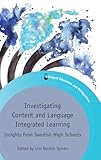Investigating Content and Language Integrated Learning : Insights from Swedish High Schools / ed. by Liss Kerstin Sylvén.
Material type: TextSeries: Bilingual Education & BilingualismPublisher: Bristol ; Blue Ridge Summit : Multilingual Matters, [2019]Copyright date: ©2019Description: 1 online resourceContent type:
TextSeries: Bilingual Education & BilingualismPublisher: Bristol ; Blue Ridge Summit : Multilingual Matters, [2019]Copyright date: ©2019Description: 1 online resourceContent type: - 9781788922418
- 9781788922425
- English language -- Study and teaching (Secondary) -- Immersion method
- English language -- Study and teaching (Secondary) -- Swedish speakers
- English language -- Study and teaching (Secondary) -- Sweden
- Language and education -- Sweden
- Language arts (Secondary) -- Sweden -- Correlation with content subjects
- EDUCATION / Educational Policy & Reform / General
- CLIL
- CLISS
- Content and Language Integrated Learning
- L2/FL learning motivation
- SLA
- assessment practices of CLIL
- bilingualism
- effects of CLIL on the target language
- extramural English
- language learning assessment
- multilingualism
- 428.0071/2485 23
- PE1068.S9
- online - DeGruyter
- Issued also in print.
| Item type | Current library | Call number | URL | Status | Notes | Barcode | |
|---|---|---|---|---|---|---|---|
 eBook
eBook
|
Biblioteca "Angelicum" Pont. Univ. S.Tommaso d'Aquino Nuvola online | online - DeGruyter (Browse shelf(Opens below)) | Online access | Not for loan (Accesso limitato) | Accesso per gli utenti autorizzati / Access for authorized users | (dgr)9781788922425 |
Frontmatter -- Contents -- Contributors -- Acknowledgements -- Part 1: The Context -- Introduction to the Volume and to Part 1: The Context -- 1. CLIL, CLISS and the Swedish Context: An Overview -- 2. Mapping CLIL in Sweden -- 3. The CLISS Student: Some Background Factors of the Participating Students in the CLISS Project -- Part 2: Assessment and Motivation -- Introduction to Part 2: Assessment and Motivation -- 4. Assessment in CLIL -- 5. CLIL and Motivation Revisited: A Longitudinal Perspective -- Part 3: English -- Introduction to Part 3: English -- 6. English Receptive Vocabulary -- 7. English Productive Profi ciency -- 8. English Reading Comprehension -- 9. Extramural English -- Part 4: Swedish -- Introduction to Part 4: Swedish -- 10. The Development of Academic Vocabulary in Swedish -- 11. The Development of Linguistic Correctness in CLIL and Non-CLIL Students' Writing in the L1 at Upper Secondary School -- 12. Visualizing Vocabulary: An Investigation into Student Assignments in CLIL and Non-CLIL Contexts -- 13. The Development of Swedish Receptive Vocabulary in CLIL: A Multilingual Perspective -- Part 5: Students and Teachers -- Introduction to Part 5: Students and Teachers -- 14. Multilingual Students in a CLIL School: Possibilities and Perspectives -- 15. Just a Little Plus: The CLIL Student Perspective -- 16. Teaching and Learning Content through Two Languages: The Biology and History Teacher Perspective -- Epilogue -- Index
restricted access online access with authorization star
http://purl.org/coar/access_right/c_16ec
This book provides a rich and unique longitudinal account of content and language integrated learning (CLIL). The chapters report on the findings from a large-scale, three-year research project undertaken at senior high school level in Sweden. The ecological perspective, with quantitative and qualitative methods, gives voice to both learners and teachers, as well as being an excellent critical example of how such longitudinal research might be carried out. Through emic and etic approaches, the book provides insights into language learning outcomes, both with regard to the target language English and the majority language Swedish; learner motivation among CLIL and non-CLIL students; effects of extramural exposure to English; issues in relation to assessment in CLIL and much more. As a whole, the book offers an unprecedented overview of learner outcomes and detailed insights into the comparison of CLIL and non-CLIL education. While it is embedded in the Swedish context, the nature of this study means that it has strong implications on an international basis.
Issued also in print.
Mode of access: Internet via World Wide Web.
In English.
Description based on online resource; title from PDF title page (publisher's Web site, viewed 24. Apr 2022)


